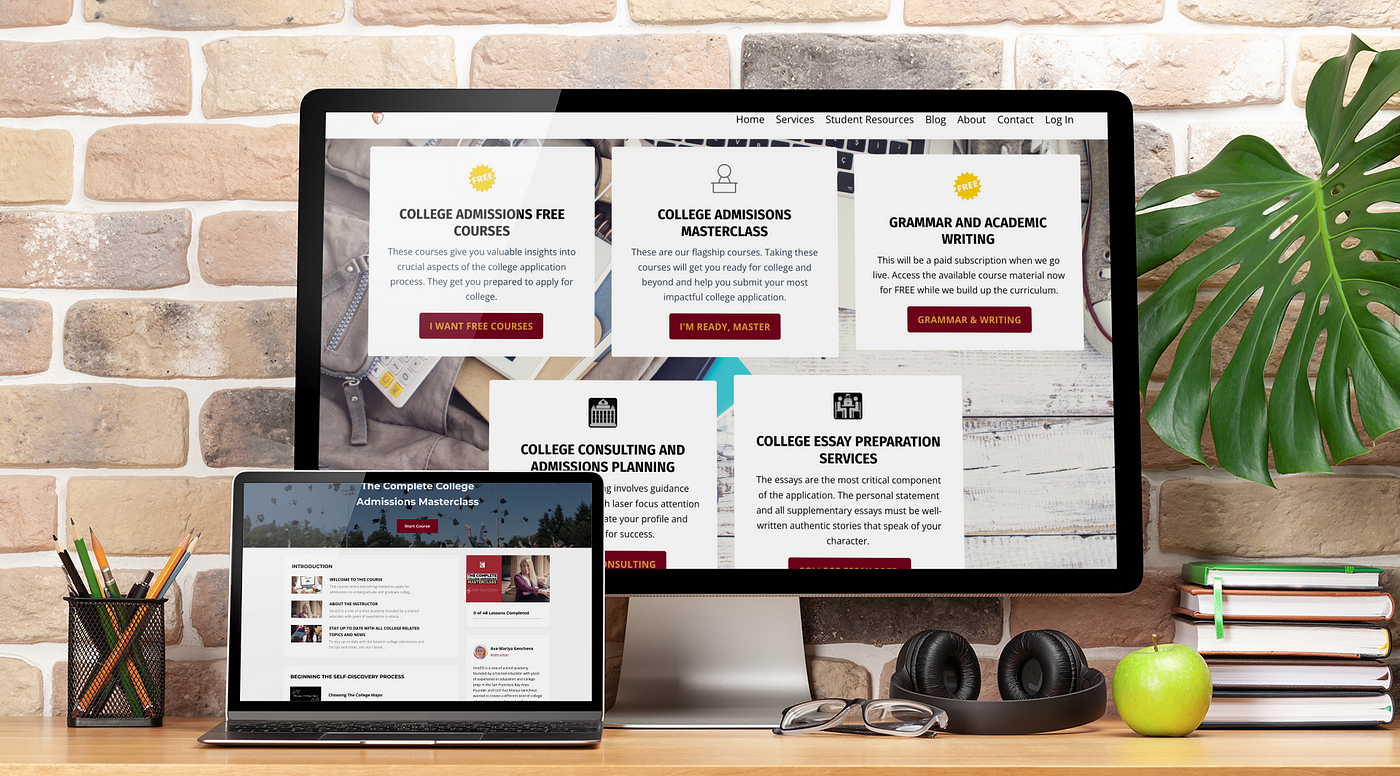7 Ways to Convince Admissions You are a Winner
May 03, 2022
Claire knew she wanted to study architecture by her freshman year of high school when she spent hours building virtual houses for characters in a computer game. Her college search was equally focused. She worked with her family and me to come up with a shortlist of schools with strong architecture programs when she decided after a campus visit that Syracuse University was the place for her. She frequently contacted a Syracuse University architecture school recruiter as she worked on her portfolio. She also scheduled an interview with a professor to show her ability to speak on her feet.
“I wasn’t the girl with the strongest grades in high school, but I put myself out there.”
Her efforts certainly paid off, as this fall, she’ll be a sophomore at Syracuse.
A strong academic profile and extracurricular profile are crucial to getting your foot at the door. However, these are only some of the attributes admissions officers are looking for in their ever more competitive applicant pool. About 64% of colleges and universities surveyed by the National Association of College Admissions Counseling show a jump in the number of applicants in the fall of 2022. In addition, the most recent stats available, as students continue to apply to a more significant number of schools, show 40% more international students in the United States now than a decade ago, according to the Institute of international education.
The same forces will persist this year, particularly at the top of the heap. Stanford University accepted just over 4% of the 82,167 applications received for the class of 2022. Yale excepted rate was 6.3%. Scary as they are, those statistics may be essential to remember that colleges are still accepting almost 2/3 of their applicants on average. For most students, it’s not that hard to get into college as long as they are doing the right thing. So what are the “right things.”
#1. Get an early headstart
College seems like a long time away, but high school goes by fast, so you don’t have much time to perfect your act. Freshman year is not a dress rehearsal, and many colleges look at your first year in high school to measure how well you are progressing in the future. I am often asked if colleges look at freshman year’s grades. The answer is yes; select schools will take the whole high school career into account, which means making sure you’re on track from the onset to fit in all the courses you might need, including getting advanced algebra under your belt by the end of the sophomore year and at least three years of foreign language.
#2. Consider your choice of courses
Some things haven’t changed. Grades in college prep courses still carry the most weight in admissions decisions. Students who can show they have successfully challenged themselves in high school are better prepared to handle college and college work simultaneously.
At the same time, no one expects you to take every AP class offered. Better to do the best you can in the highest level classes that make sense given your interest and aptitude while getting eight to nine hours of sleep at night.
We see too many students taking advanced courses across the curriculum only to crash and burn by senior year because they’ve taken on too much on their shoulders. It’s most important to take AP classes in your areas of strength because your guidance counselor will send colleges a detailed profile of your school and its curriculum; the people vetting applications will know how much you have challenged yourself and if you’ve taken advantage of all your school has to offer, or you’ve gone after easy A’s.
Naturally, there is no need to see students who intend to pursue journalism in AP biology, chemistry, or Physics C. If you are one of those students, you are probably better off with the advanced English course. But if someone is planning on majoring in engineering, on the other hand, they should undoubtedly prioritize AP math and science.
#3. Hone on your extracurriculars
Have you been joining a laundry list of clubs to look impressive?
Focus on what comes easy and what you are naturally good at, participate in that one activity and keep the rest only as a mention on the resume.
Colleges are looking for two or three things done in-depth. The goal is to select a well-rounded class of freshmen passionate about their particular interests, and admissions want to get a sense from your application of who you are. So in your activities list, you can show off your different facets–whether you’re an athlete who is also doing community service or an actor performing research. Even if you need to focus on making money during the summer, those months can often be used strategically to develop your story.
Doing something meaningful doesn’t imply an extensive enrichment or study abroad program. Those are no more impressive than a summer job or volunteer activity close to home.
The key is to follow up on academic or extracurricular interests but not repeat the same experience repeatedly. A dedicated baseball player who spent much of one summer practicing and playing, for example, might volunteer next summer to help coach Little League.
#4. Develop a smart shortlist
Putting together a colleges list requires a long look at websites and the study of all those websites:
- Pause and access who you are and what you’re good at, then consider how your learning style will fit your chosen colleges. For example, are you looking for a large classroom size, lectures, discussions, intensive seminars, or are you Okey with more personalized attention?
- You should be able to come up with five reasons for applying to every school on your list, then run the list by your guidance counselor to be sure you’re being realistic about the chances for admission based on previous numbers of admits and database stats.
- It would be best if you planned to have a few safe bets on your college list in addition to considering EA and/or ED.
Some 40% of colleges reported an increase in the number of applicants accepted through binding ED for the fall of 2022, meaning that students promise to attend if accepted. In addition, about 68% applied for non-binding early action acceptances, which means students get word early without an obligation to attend. If you are considering EA, make sure that you have strong grades in your sophomore and junior year of high school, as you will be judged based on your performance primarily in these two years.
Colleges like to admit students who are a sure thing, and the odds of clearing the bar are often better. I remember a statement made by Mike Sexton during his time as the VP for Enrollment Management at the University of Santa Clara, “I have students whose applications were read in the regular season round and placed on the waitlist when they would have been admitted had they applied early.” Still, the early decision has its disadvantages. You have to know your first school choice very early in your senior year or even before senior year begins. Also, you have less bargaining power regarding financial aid numbers, which is not a small matter.
#5. Establish Interest
As it becomes easier for students to apply to multiple schools electronically and by using the common application, admissions officers are alerted of stealth candidates who do nothing but fill out the forms. If you want to be taken seriously, you’ve got to show them some love. Visiting is the best way to get a feel for the school; the best way to show your interest is to take the tour, meet with admissions officers, and ask questions. With a bit of notice, you can arrange to attend classes and meet with the professor whose area of research intreats you. If you can’t visit, take advantage of local college fairs and every other opportunity to contact the admissions to let them know you think they are the best fit for you. This is what Alina Feng, who toured several liberal arts colleges and zeroed in on Beloit College in Wisconsin after visiting. She stayed in touch with the admissions office when she had questions and even drove three hours to a college fair to connect with the school again. She’s now a freshman in Beloit.
#6. Impress them with your essay
The golden rule for choosing an essay topic is to give a sense of your personality to go with the grades and test scores. The essay is also an excellent opportunity to address apparent flaws in your application and any grades anomaly. Here are some free resources to give you a headstart wwww.voicedacademy.com

Last but not least, put serious thought into who are the teachers you plan to ask for recommendations. Don’t always choose teachers who gave you straight As; instead, ask a teacher who watched you struggle. They can show how you respond to challenges, and finally, keep careful track of deadlines and meet them.
#7. Take the lead throughout the process
It’s critical to remember that you, not your parents, are running the show. Take charge of creating a list or arranging visits and interviews, and then do the talking. Try reaching out to the admissions officers with questions on your own rather than having your mom do it during her lunch hour.
These tips only scratch the surface, and for more, you can always check www.voicedacademy.com for free courses and student materials to help you in your journey.
VoicED
Stay connected with news and updates!
Join our mailing list to receive the latest news and updates from our team.
Don't worry, your information will not be shared.
We hate SPAM. We will never sell your information, for any reason.

